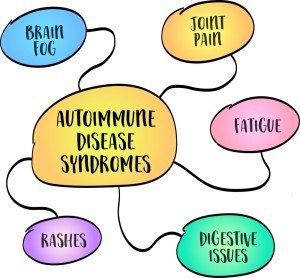Gut Health & Autoimmune Disorders: What’s the Connection?
 Autoimmune disorders are any group of conditions that result from the malfunctioning of the immune system.
Autoimmune disorders are any group of conditions that result from the malfunctioning of the immune system.
Your immune system is your body’s built-in security team. It’s designed to spot anything that doesn’t belong (like viruses, bacteria, or toxins) and send out white blood cells to neutralize the threat.
But sometimes, that security team gets confused. Instead of protecting you, it starts attacking your own healthy cells. That’s what happens in autoimmune disorders — and there are more than 80 different types of them.
Some affect your joints (like arthritis or rheumatic fever). Others target muscles (lupus, myositis), skin (psoriasis, hives, rashes), or your digestive system (Crohn’s disease, Celiac disease, ulcerative colitis). Autoimmune conditions can even impact the endocrine system (thyroid disease, Type 1 diabetes) or the nervous system (multiple sclerosis, Guillain-Barré syndrome).
The symptoms can be wide-ranging — chronic inflammation, fatigue, brain fog, skin issues, and more.
The Gut-Immune System Connection
Here’s the surprising part: the most powerful immune organ in your body isn’t your spleen or lymph nodes — it’s your gut. Around 70% of your immune system lives in your digestive tract.
Inside your gut lives a bustling community of trillions of microorganisms — bacteria, fungi, and other microbes — known as the gut microbiome. When this community is healthy and balanced, it helps:
– Train immune cells to respond appropriately
– Keep inflammation in check
– Maintain a strong gut lining to block harmful invaders
But when the microbiome gets out of balance (a condition called dysbiosis), things can go wrong. You might develop chronic inflammation, food sensitivities, or even autoimmune conditions.
How the Gut “Trains” Your Immune System
From the time you’re born, your gut bacteria are like personal trainers for your immune system. They help it learn the difference between “friend” and “foe.” As you grow, your gut health continues to change — influenced by your diet, stress levels, medications, and environment.
If this balance is disrupted, the gut lining can weaken, leading to what’s known as “leaky gut,” — where unwanted particles sneak into the bloodstream. This can trigger your immune system to overreact, sometimes even against your own tissues.
Signs Your Gut Might Be Affecting Your Immunity
You don’t have to have stomach pain to have gut problems. Watch for:
– Frequent colds, allergies, or new food sensitivities
– Chronic fatigue or brain fog
– Skin problems like rashes or acne
– Digestive issues — bloating, gas, constipation, or diarrhea
– Anxiety or mood changes (yes, your gut impacts your brain!)
Supporting Your Gut for Better Immune Health
The good news? You can support your gut and, in turn, your immune system. Here’s how:
- Eat more vegetables — especially leafy greens.
They’re loaded with fiber, which your good gut bacteria love to eat. Think spinach, broccoli, asparagus, leeks, and onions. - Feed your microbiome with prebiotics.
These are foods that nourish your beneficial bacteria: apples, garlic, bananas, nuts, beans, root veggies, green tea, and even cocoa. - Add fermented foods for probiotics.
Probiotics are live bacteria that help balance your gut. Yogurt (unsweetened), kefir, kimchi, sauerkraut, pickles, and kombucha are great options. - Consider gut-friendly supplements.
Probiotics, digestive enzymes, L-glutamine, zinc, omega-3s, and even camel milk (yes, really!) can help repair and protect the gut lining. - Build healthy daily habits.
Stay hydrated, get 7–9 hours of quality sleep, manage stress through deep breathing or gentle movement, and avoid excess sugar, alcohol, and processed foods.
When your gut thrives, your whole body benefits.
We Suggest Camel Milk to supplement your Gut Health?
An imbalance of the gut microbiome in the intestines may contribute to health disorders
Many compounds found in camel milk benefit the good bacteria in the gut because they provide a broad spectrum of beneficial probiotics and prebiotics in the form of oligosaccharides. Oligosaccharides contribute to digestive health by decreasing gut permeability and supporting a healthy microbiome.
Camel milk is a natural food and is an excellent source of protein. It also includes B vitamins, vitamin C, vitamin E, potassium, phosphorus, iron, immunoglobulins, calcium, selenium, omega-3 fatty acids, lactoferrin, and zinc.
Find out why Camel Milk is so nutritious. CAMEL MILK
Want to try Camel Milk? Try 2 Packets for 24% Off & Free Shipping (Go to Shop to Order)
STILL HAVE QUESTIONS? EMAIL AND GET YOUR QUESTIONS ANSWERED.
Sign up to receive the MCVitamins Newsletter!
Up-to-date info on the latest health-related news happening in the world
(available in English only)

